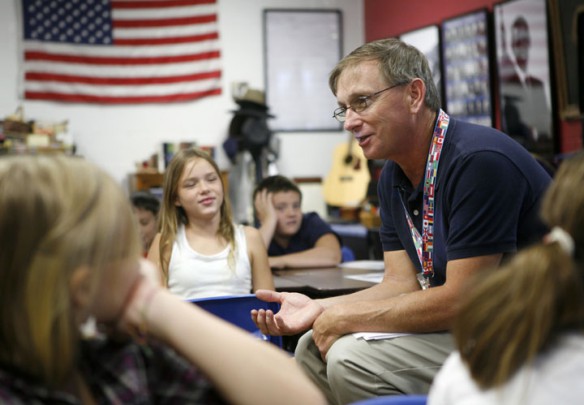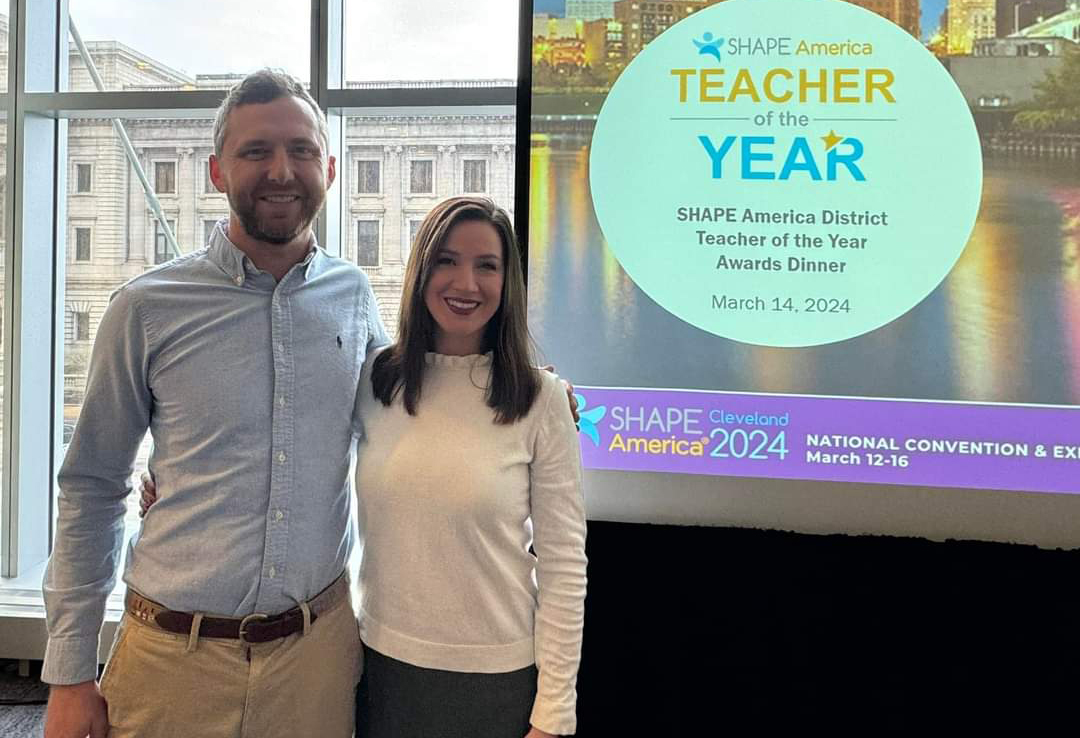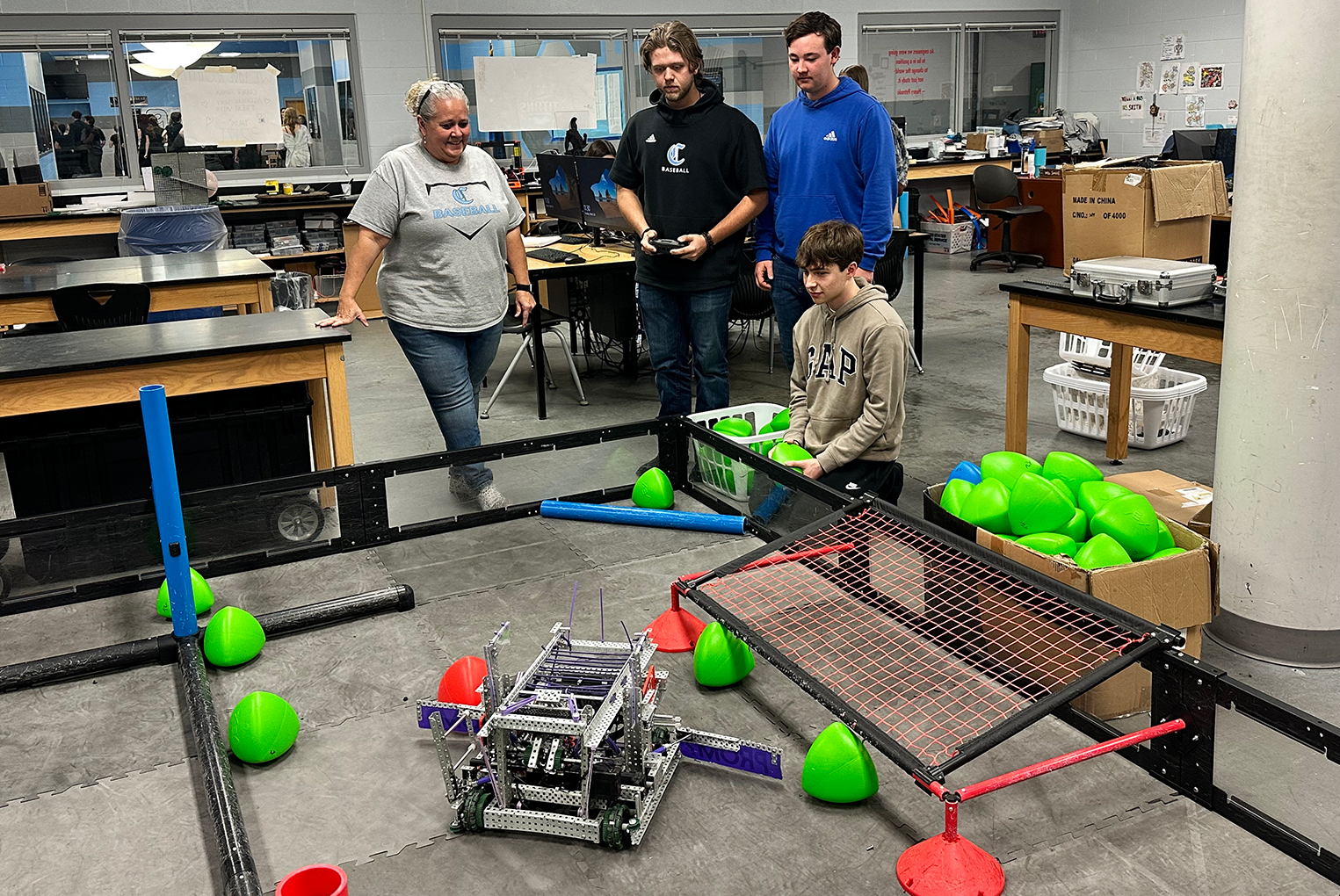
Donnie Wilkerson talks with his 5th-grade history class at Jamestown Elementary School (Russell County). Wilkerson was recently named the 2011 Kentucky History Teacher of the Year. Photo by Amy Wallot, Sept. 2, 2011
By Matthew Tungate
Walk by Donnie Wilkerson’s 5th grade social studies classroom at Jamestown Elementary (Russell County) and you might think that his students are just eating ice cream.
But what they’re really doing is learning about the War of 1812 – by way of U.S. President James Madison’s favorite sweet treat, strawberry ice cream.
Wilkerson’s students may spend 25 minutes doing traditional work and five minutes eating ice cream, but it is the five minutes they remember, he said.
“My students ask, ‘Are we going to do any work today,’ and I tell them, ‘You’re working every day; you just don’t know it sometimes,’” said Wilkerson, who is in his eighth year of teaching.
“You can’t have strawberry ice cream every day.”
In recognition of his creative and engaging approach, the Kentucky Historical Society (KHS) announced in June that Wilkerson had been named the 2011 Kentucky History of the Year. The award is co-sponsored by the Gilder Lehrman Institute of American History, HISTORY (History Channel) and Preserve America.
Wilkerson will be honored Nov.11 at KHS’s annual History Awards Program at the Old State Capitol. He will receive a $1,000 honorarium and is in the running to be named the National History Teacher of the Year. He also will receive an invitation to a Gilder Lehrman summer seminar and the opportunity to participate in KHS’s Kentucky History Educational Conference next July.
Wilkerson’s selection also means Jamestown Elementary will be named a Gilder Lehrman Affiliate School and its library will receive a core archive of history books and educational materials from the Gilder Lehrman Institute of American History and HISTORY.
In its comments, the award’s judging panel said Wilkerson “makes social studies come alive for his students [and] combines technology, artifacts and primary source documents to help students grasp the core content being taught. What a fun, exciting place for social studies learning to take place.”
Students need a good mix of traditional teaching and surprises, Wilkerson said.
“Students don’t want the same thing every day,” he said. “Believe it or not, they wouldn’t want strawberry ice cream every day.”
A dream deferred
Wilkerson, who was nominated for the award by one of his former students, said he always wanted to be a teacher but instead graduated from college with a degree in civil engineering technology and spent several years working in business and politics.
“I guess I let my pocketbook speak more than my heart,” he said. “I really don’t have any regrets for having done that, because the life experiences that came by having been in business world and the political world for 25 years have been a great asset in the classroom.”
Wilkerson worked in the family building supply business as a kitchen and bath designer before deciding to pursue his dream of teaching by going through an alternative certification program.
When he was in business, Wilkerson said he worked the same number of hours he does as a teacher but dreaded going out in public because he would see people who were waiting on him for materials or to get a job done.
“Now I relish it because I’m going to see parents and students, and they’re talking about what we’re doing in class,” he said.
Wilkerson also was active in politics while he was in the business world. He volunteered in several state and national campaigns, and was mayor of Jamestown from 1993-98.
That experience makes him want to help students be critical thinkers, Wilkerson said. Politics is all about spin, perception, perspective and how things are presented, he said.
“If you listen to one commercial, this guy’s just the devil,” Wilkerson said. “In the next commercial, he’s the hero.”
Students need to look at history in the same way, he said. “Students need to be exposed to a plethora of information,” Wilkerson said.
Immersion learning
That’s why he tries to go beyond just textbooks, and use what he calls immersion learning, Wilkerson said.
“You’ve got to involve them in everything from foods to sounds to history to taking them to the actual sites where these things take place – not just read about it,” he said.
Students have to be engaged, so they have to have some motivation to be involved – just like with the lesson involving the strawberry ice cream, Wilkerson said.
“I often hook students with food,” he said, adding that he uses period foods at every juncture of history.
For instance, students recently were learning about explorers and Holland, so Wilkerson brought in windmill cookies. In another lesson, he’ll dress up like John Smith, and students will eat sunflower seeds because they helped English settlers survive at Jamestown, Wilkerson said.
Food isn’t the only prop Wilkerson uses to make his lessons real to students. For example, in one lesson he has students listen to an audiobook of a passage in the book 1776 where George Washington and his troops cross the Delaware River. While listening to the book, students dip their hands in ice water so they experience what the soldiers did for hours, Wilkerson said.
“Things get a little crazy around here,” he said.
Rebecca S. Hanly, program coordinator in the Education Department of the Kentucky Historical Society, said that when teachers use artifacts (objects) and other primary source materials (such as diaries, letters and newspapers) in their lessons, students can become immersed in the time period they are studying.
“When reading only a textbook or hearing a teacher’s lecture, while these can be valuable tools, students are one or two steps removed from the actual process of doing history,” she said. “By reading and analyzing the raw materials of history, they are the ones doing the investigating and discovering, not someone else doing it for them. They formulate the questions they are interested in knowing more about and then go find the answers rather than a third party deciding what’s most important.”
All ways of teaching – from reading and lecture to hands-on manipulation – can be effective if teachers are passionate about their subject, Wilkerson said.
Kentucky Adventures
Wilkerson is nothing if not passionate. In fact, he so wants to immerse his students in history that he takes students to various historical sites throughout the state. Together, they visit museums, battlefields, forts, caves and other cultural sites on what he calls “Kentucky Adventures.”
“To see the excitement and to hear them talk about what they’ve learned. I have students that talk about this years later,” Wilkerson said.
Jamestown Elementary Principal Wayne Ackerman said Wilkerson’s willingness to give of his time and himself are what set him apart. So is his ability to understand the students in the school, Ackerman said.
For instance, Wilkerson recently asked his students to list items associated with the term “furniture.” Ackerman said he expected response like chairs, tables and couches. Instead, the first three responses Wilkerson got were “bed bugs, smells and old.”
“We have 70 percent free/reduced lunch with high unemployment,” Ackerman said. “Most of our students have limited backgrounds with limited resources, and he is relentless in his effort to provide unforgettable learning opportunities that make all students feel they can achieve at a high level.”
That’s what makes it worth doing, Wilkerson said.
“It’s nice to be recognized, but it’s not about that. The feeling you get from seeing these kids learn and to see the expression on their face when they get to do things that they’ve never gotten to do before… ,” he said, his voice trailing off.
It’s also “neat” to see 6th graders walk by the door and recognize what his class is doing, Wilkerson said.
“They said, ‘You all are doing manifest destiny today. They didn’t say, ‘You all are dressing up as Mormons.’ They remembered the term,” he said. “I can’t imagine that a student would ever pass a classroom, look in and see them working on a worksheet and say, ‘Oh, you all are doing that worksheet.’”
MORE INFO …
Donnie Wilkerson, donnie.wilkerson@russell.kyschools.us, (270) 343-3966








I’m one of Mr.wilkerson’s students and I thougt the pasge about him was amazing and nice pictures Amy Wallot. :-) :-) :-) :-) :-)